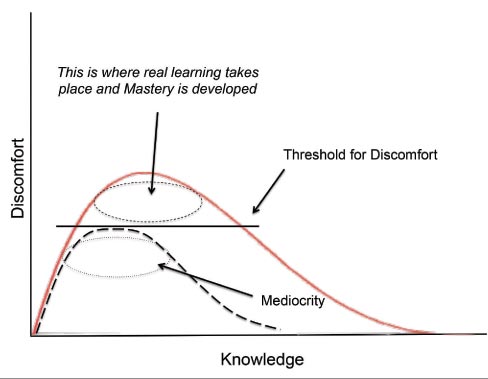Mediocrity or Mastery?
Richard Pierce Thomas
Leadership and Small Business Consultant
 “The reason I don’t work with startups,” I explained to a colleague recently, “is not because they don’t have money, though that is a good reason not to. I avoid working with startups because they haven’t learned anything yet.”
“The reason I don’t work with startups,” I explained to a colleague recently, “is not because they don’t have money, though that is a good reason not to. I avoid working with startups because they haven’t learned anything yet.”
My explanation underscores what I have experienced not only in my own startups but also in the multitude of others I have encountered in my advisory work. In most cases, startups are comprised of young entrepreneurs who spend almost as much time daydreaming about the fortunes they are going to make as the time they devote to making the fortune in the first place.
“Go make some mistakes and learn something,” I usually counsel young entrepreneurs. “Then we’ll have something to talk about. I’ll even buy the beer!” As often as I’ve made the offer, I can count on one hand the times I have been taken up on it. All of which that leads me to a simple realization about why startups are so important to the formation of a business owner, and it is not because of the potential fortune.
The truth is that even if the startup manages to survive and become a viable business, it will still face substantial challenges in achieving the financial success the entrepreneur had hoped for, underscoring what most of you know by now – there are no guarantees.
So, why do it in the first place? While there are a multitude of reasons, the ultimate payoff in leading a startup through to operational success is in the journey itself – the “hard knocks” experience that comes with the adversity and persevering to overcome the challenges. It is in that learning experience where the ultimate payoff is, however for most it won’t materialize until some unknown time in the future, whether in the next startup or the fifth one.
As disheartening as this may sound, there is a way to accelerate this journey by learning to operate beyond your threshold for discomfort. The region of the graph above the line illustrates where the discomfort is most significant, when the experience tips from being driven by the giddy energy of starting something new, to being driven by the will to survive, even if only to make it to the next day.
I refer to this point of realization as the Moment of Truth, when the last shred of ignorance is ripped from the entrepreneur’s eyes and they now realize the magnitude of the challenge they are up against. This is where the journey to success truly begins and the entrepreneur is forced to choose to either continue in spite of the odds against them, or throw in the proverbial towel.
Coincidentally, it is also at this point that the leader’s journey transitions from one of mediocrity to a journey of mastery. Willingly going beyond the discomfort threshold will not only accelerate the necessary learning for the current venture, but also form the hard earned wisdom needed for the next.
The brutal truth in all of this is you will not accomplish anything of significance until your leadership has experienced life beyond the threshold of discomfort. And this doesn’t apply just to startups either as even for mature businesses that have experienced success, without intentional guidance and leadership in pushing the organization into the realm of discomfort in growth and development, the business will backslide into mediocrity.
An example of this type of common mistake is in interpreting any current financial success as the result of current actions. In most cases, they are not. Financial results are a lagging indicator. They are the results of past decisions and actions and yet leaders too often compound this misunderstanding by assuming today’s profitable results will continue tomorrow without questioning what needs to be done differently in today’s decision making to be as good or better than yesterday’s. This is also known as complacency and complacency equals mediocrity.
Regardless of what type of business you are in, whether startup or mature business, commit to pushing your leadership and your organization beyond the threshold of discomfort. This is where the true learning takes place and leading in the learning during the discomfort here will sow the seeds of future success and growth.
Rick Thomas is a Principal and Director of Human Capital at Pilot Wealth Management, a registered investment advisor in Oregon state. Leading their focus on the human component of building wealth, he consults and speaks to organizations across the country, focusing on individual and organizational achievement.